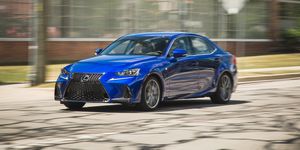The luxury compact sedan segment has seen a lot of change since the Lexus IS was last redesigned in 2013. The BMW 3-series has entered a new generation, as has the Mercedes-Benz C-class. The Alfa Romeo Giulia and Genesis G70 have joined the scene. With the sport-sedan arms race proceeding at a rapid pace, Lexus’s aging entry is struggling to keep up.
The only change to the IS lineup for the 2020 model year is a new Black Line special edition package, which our all-wheel-drive IS350 F Sport test car was outfitted with. For $2905, the package adds black exterior accents, heated and cooled leather front seats, and a steering wheel made of blue wood, among other minor aesthetic upgrades. The IS350 basics, including a 311-hp 3.5-liter V-6, six-speed automatic transmission, and optional all-wheel drive, are well known by now. (Rear-drive IS350s get an eight-speed automatic.) Opting for the $2365 F Sport upgrade adds a sport-tuned suspension, adaptive dampers, a Sport+ driving mode, revised front and rear bumpers, an updated instrument cluster, and various interior trim upgrades.
Inside, this Lexus puts up a luxurious front, with soft leather and real wood. But there’s also plenty of plastic to be found. The infotainment system uses a large screen with good resolution, but the touchpad controller is overwrought and almost impossible to operate safely while driving. Our test car rang in at $53,599, a price at which the IS’s value proposition—often a big selling point for Lexus—begins to evaporate.
Our car made merely a decent showing with its straight-line acceleration, running to 60 mph in 5.5 seconds and pushing through the quarter-mile in 14.1 seconds at 100 mph. That’s plenty quick for the average driver, but the IS’s competition accelerates much better. Our long-term BMW M340i hotfoots to 60 mph in 3.8 seconds and blasts through the quarter-mile in 12.3 seconds. A Genesis G70 with its optional twin-turbo 3.3-liter V-6 needs 4.4 and 13.0 seconds in the same measurements.
The M340i starts at $54,995, a negligible increase compared to our heavily optioned IS. The G70 V-6 starts at $47,545, slightly above our test car’s $45,370 base price. Both the Bimmer and the Genesis have significantly more horsepower than the IS—and more modern eight-speed automatic transmissions—so it’s not a surprise that they return better performance. Despite the IS’s general flexibility and solid handling dynamics, its outdated powertrain keeps it from playing in the same league as the newer members in its class.
While we prefer the rear-drive version with additional gears and a better balance to its cornering behavior, the IS350 F Sport in either form is unquestionably the best-driving IS. The F Sport suspension reigns in the soft floatiness of the standard car’s ride quality without ever making it feel harsh. The steering is well-weighted and accurate. The cabin is quiet and isolated even when you’re pushing the car hard. And we’ll always pass on the standard turbo-four for the 350’s V-6. Still, even a Nissan Altima family sedan on all-season tires shames our test car’s 0.83 g of grip around the skidpad, and a four-cylinder 3-series will beat it in a straight line. The Lexus IS remains a well-balanced and versatile sedan, but it needs to up its game to contend with the fresher members in its segment.
Source: Reviews - aranddriver.com





